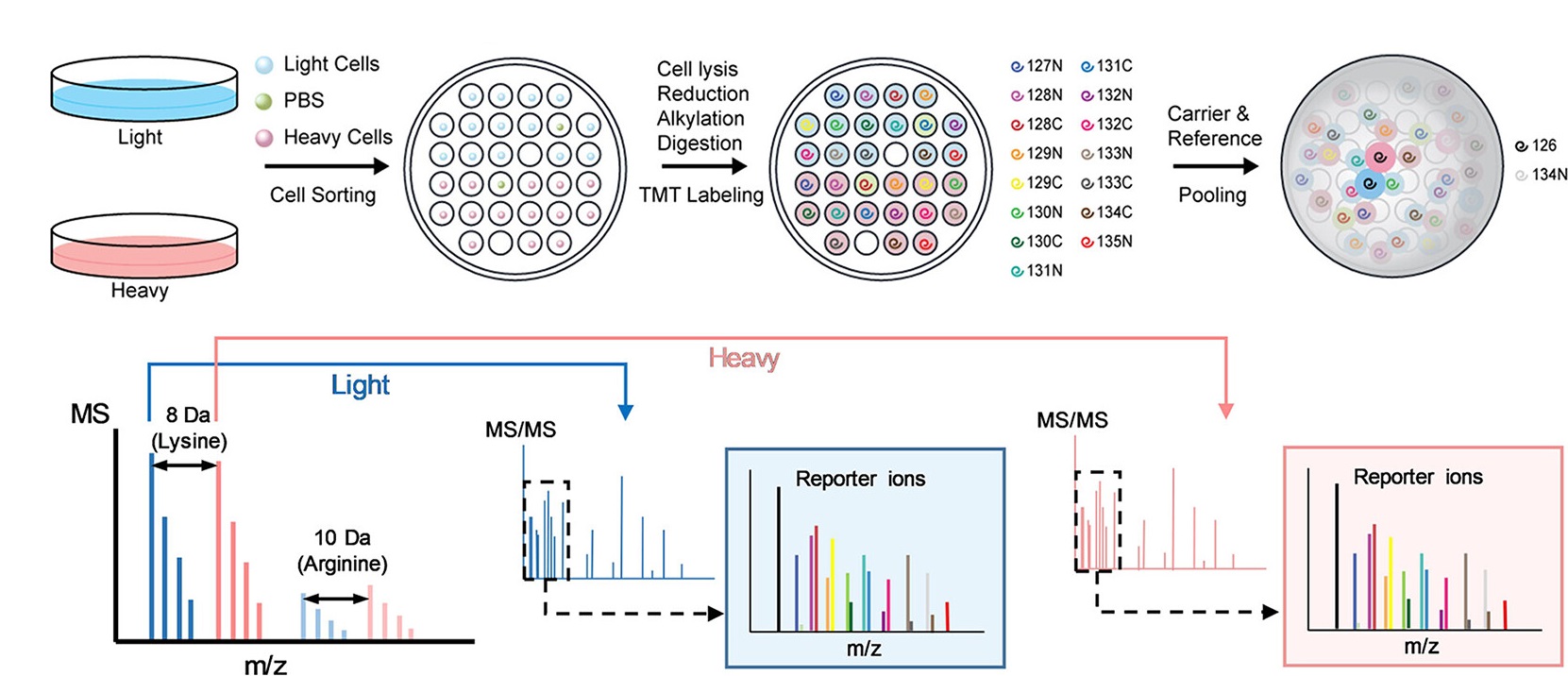Isotope Labeling Peptidomics Analysis Service
Isotope labeling peptidomics is a mass spectrometry-based analysis method that enables relative quantification and comparison of peptides from different samples by introducing stable isotope labels. By incorporating stable isotope labeling into peptides or their precursor proteins, this method allows for high-precision quantification and comparison of peptide abundance across multiple sample groups. Through standardized processing workflows, it detects the mass differences and signal intensity of isotope-labeled peptides in the mass spectrometer, accurately inferring changes in the expression levels of target peptides in different samples.
Isotope labeling peptidomics analysis service is widely applied in fields such as biomarker screening, disease mechanism research, drug target validation, cell signaling pathway analysis, and functional peptide discovery. It is particularly suitable for systematic peptidomics studies under multiple conditions, various time points, or complex backgrounds.
Services at MtoZ Biolabs
Based on high-resolution liquid chromatography-mass spectrometry platforms, MtoZ Biolabs introduces the isotope labeling peptidomics analysis service focusing on relative quantitative analysis of peptides under isotope labeling conditions. This service supports peptides from various biological sample sources, using stable isotope labeling to precisely compare the relative abundance of peptides across different experimental groups. Clients can obtain high-quality analysis data, including peptide identification information, quantitative ratios, significance differences, and functional annotations, which facilitate expression difference studies and biological mechanism analysis under multiple conditions.
Analysis Workflow
1. Sample Preparation and Peptide Extraction
Clients provide peptide samples from different experimental conditions, ensuring stable and consistent quality, suitable for isotope labeling processing.
2. Isotope Labeling Reaction
Stable isotope reagents are used to chemically label peptides in each group of samples, allowing them to be distinguishable in mass spectrometry.
3. Peptide Mixing and Purification
Samples with different labels are mixed in equal amounts, followed by necessary purification to remove impurities and improve analysis sensitivity.
4. LC-MS/MS Detection
High-resolution liquid chromatography-mass spectrometry platforms are used to separate and quantitatively analyze the mixed samples, capturing MS signals of each labeled peptide.
5. Data Processing and Results Output
Professional software is used to calculate the relative abundance of peptides in different samples, generating quantitative reports and bioinformatics analysis results.

Wang, Z C. et al. ACS Measurement Science Au, 2024.
Figure 1. Analysis Workflow of Isotope Labeled Peptidomics Using TMT Labeling Method.
Sample Submission Suggestions
1. Sample Type
Supports peptide samples from various biological sources, including serum, plasma, tissue homogenates, cell lysates, and more. If protein extraction and enzymatic digestion are required, please provide sufficient sample volume.
2. Sample Storage and Transport
Samples should be stored at −80°C and transported using dry ice to avoid repeated freeze-thaw cycles. Ensure the sample container is properly sealed before transportation to prevent contamination or leakage.
3. Sample Information
Please provide detailed sample background information, including experimental grouping, treatment methods, sample IDs, and required labeling channel information to ensure the labeling strategy aligns with the experimental design.
Service Advantages
1. High-Throughput Data Acquisition
Using high-resolution mass spectrometry platforms, this service supports parallel analysis of multiple samples, providing high-throughput and multi-dimensional peptide data, ideal for large-scale studies.
2. Flexible Labeling Strategies
Depending on different experimental needs, flexible isotope labeling strategies are offered to support multi-sample and multi-condition comparative analysis, enhancing the flexibility and diversity of research.
3. Customizable Services
Based on the customer's research objectives and sample types, personalized experimental design and data analysis plans are provided, ensuring that specific research needs in various fields are met.
4. One-Stop Service
From sample processing, isotope labeling, mass spectrometry analysis to data analysis and report output, MtoZ Biolabs offers comprehensive technical support, simplifying experimental procedures and enhancing research efficiency.
Applications
1. Multi-Sample Comparative Analysis
The isotope labeling peptidomics analysis service is suitable for comparing peptide expression differences between various experimental groups, treatment conditions, or time points, helping to uncover regulatory mechanisms in biological processes.
2. Protein Function Research
By analyzing peptide expression differences under different conditions, this service helps reveal protein functional regions, mechanisms of action, and their roles in cellular functions.
3. Signal Transduction Research
The isotope labeling peptidomics analysis service can be used to monitor changes in peptides within cellular signaling pathways, helping to better understand the activation and inhibition processes of signal transduction and their biological significance.
4. Biomarker Screening and Validation
Using isotope labeling techniques, this service helps screen and validate potential disease-related biomarkers, providing essential data support for early diagnosis and personalized treatment.
FAQ
Q1: Is the Isotope Labeling Peptidomics Method Suitable for All Types of Peptides?
A1: Yes, this method is suitable for most peptides, particularly those containing lysine and the N-terminal. The efficiency of labeling may vary depending on the peptide, so it is recommended to provide peptide sequence information to optimize the labeling efficiency. For peptides that are difficult to label, experimental conditions may need to be adjusted.
Q2: Can Multiple Samples Be Analyzed Simultaneously?
A2: Yes, this service utilizes isotope labeling techniques, allowing multiple samples to be processed simultaneously for comparative analysis. This is especially useful for peptide quantification analysis across different experimental groups or time points, helping to reveal the expression differences of peptides under various conditions.
Deliverables
1. Comprehensive Experimental Details
2. Materials, Instruments, and Methods
3. Data Analysis, Preprocessing, and Estimation
4. Bioinformatics Analysis
5. Raw Data Files
How to order?







